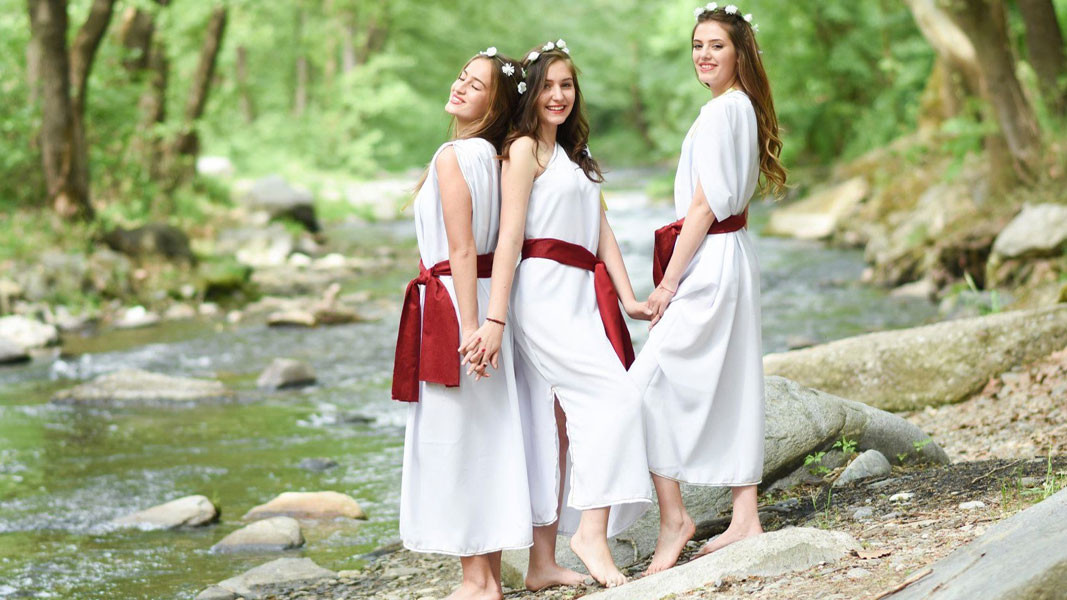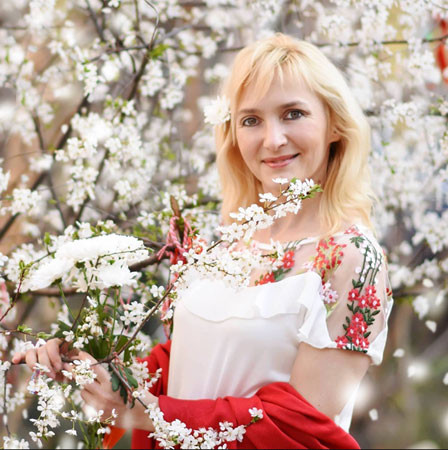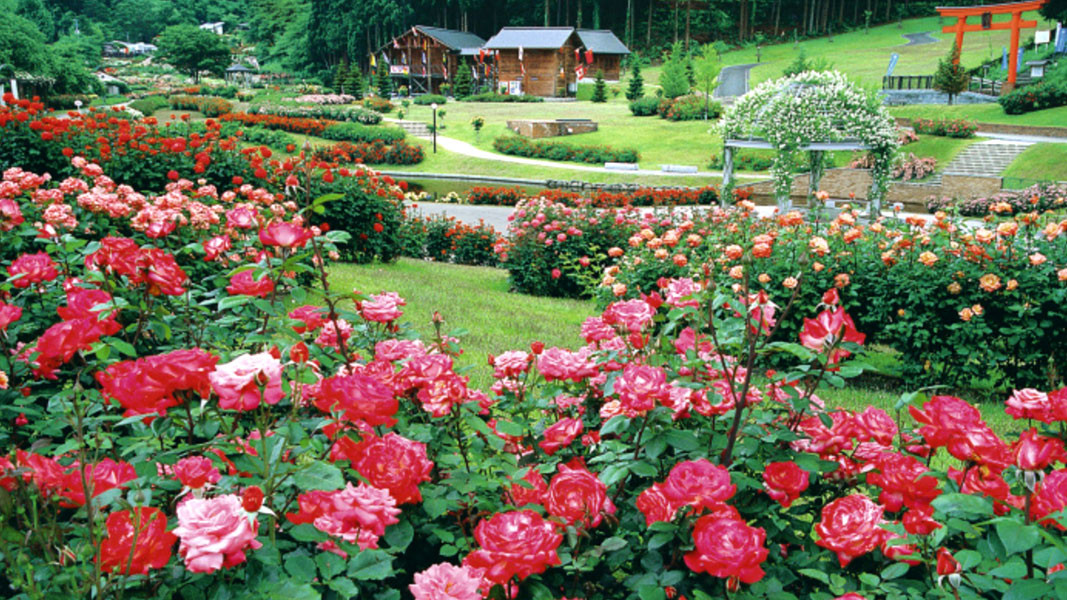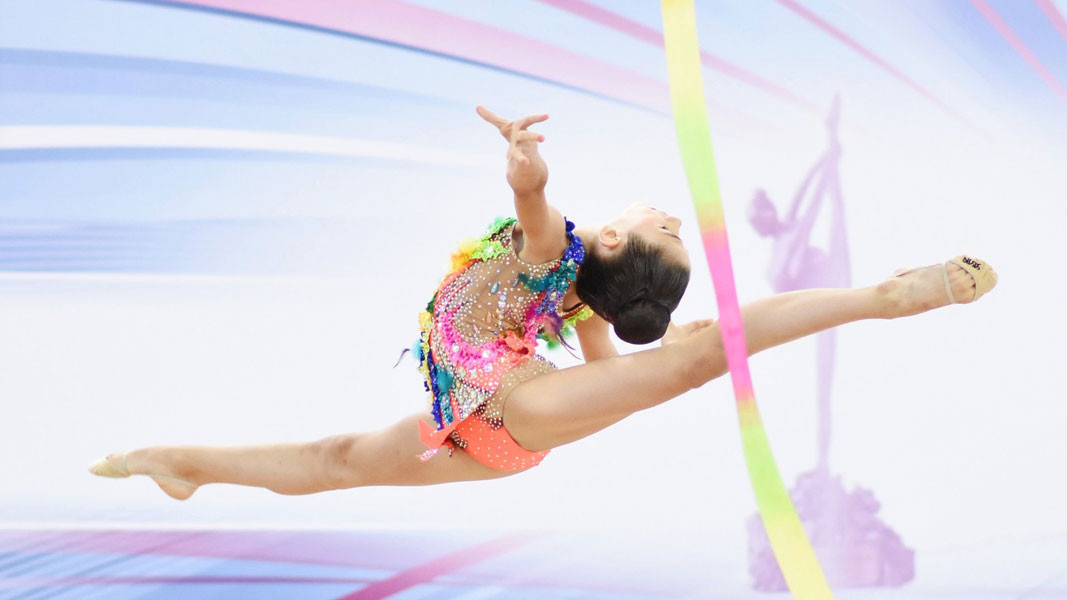A beautiful woman with a wreath of roses will be the image of Bulgaria during the Summer Olympic Games in Tokyo. A photo of her will be used for printing an anniversary stamp in Japan.
Inspired by a painting by Vladimir Dimitrov - the Master, photographer Dimitra Lefterova initially planned to shoot a session with sunflowers. However, when she met her future model, she decided to recreate the Bulgarian rose picking ritual. According to traditions, the most beautiful girl is chosen, as she could compete in grace and perfection with the rose.
 The camera captured a teacher from the Bulgarian town of Hisarya, Krasi Kisyova, dressed in a bright folk costume, which seems to have absorbed the color of roses – just like in a painting by an artist.
The camera captured a teacher from the Bulgarian town of Hisarya, Krasi Kisyova, dressed in a bright folk costume, which seems to have absorbed the color of roses – just like in a painting by an artist.
 This photograph by Dimitra Lefterova became part of an exhibition in the Japanese city of Murayama and the hosts were so impressed that they printed a stamp with the image to represent Bulgaria during the Summer Olympics.
This photograph by Dimitra Lefterova became part of an exhibition in the Japanese city of Murayama and the hosts were so impressed that they printed a stamp with the image to represent Bulgaria during the Summer Olympics.
 In the photo ‘Rose Picking’, Krasi is in the role of a rose picker wearing an authentic costume from the region of Hisarya, Dimitra Lefterova says. With this photo we wanted to show one of the most recognized Bulgarian symbols - the rose. The Japanese are very delicate people - they strive for perfection and love roses and flowers in general, as well as the beauty of women and nature. They value what we have, while we seem to forget this wealth. There are many beautiful women in Bulgaria and beautiful natural scenery. That is why it was normal for the Japanese to choose Krasi to represent our country.
In the photo ‘Rose Picking’, Krasi is in the role of a rose picker wearing an authentic costume from the region of Hisarya, Dimitra Lefterova says. With this photo we wanted to show one of the most recognized Bulgarian symbols - the rose. The Japanese are very delicate people - they strive for perfection and love roses and flowers in general, as well as the beauty of women and nature. They value what we have, while we seem to forget this wealth. There are many beautiful women in Bulgaria and beautiful natural scenery. That is why it was normal for the Japanese to choose Krasi to represent our country.
Krasi grew up in a family of folk singers and frequently went to concerts and danced as a child.
In the photo I am wearing a striped cotton shirt decorated with hand-knit lace. The vest is made of velvet and embroidered with colored threads and on my waist I have a beaded belt. The costume was worn until the mid-20th century and is typical of the region of Hisarya. I inherited it from my grandmother and it is very precious to me. I am collecting folk costumes and so far I have collected costumes from all the folklore regions of Bulgaria. But this one is the closest to my heart and I love wearing it very much.
What is it like to wear a traditional Bulgarian costume?
When I wear a folk costume, I change completely, Krasi Kisyova replies. At folklore gatherings I meet people who also wear national clothes and the energy is very nice as that is how one returns to their roots. We know that our grandmothers put a lot of effort into making these clothes with their own hands. It is the decorations and embroidery that have encoded their dreams and symbols for health, for love and happiness.
Committed to tradition, Krasi Kisiova organizes the “Haidut Gencho” folklore gathering in Hisarya, dedicated to the local protector during the times of Ottoman oppression. She has also been dreaming of visiting Japan and the city of Murayama where nature is similar to that in the Bulgarian Rose Valley, so it is not by chance that the city has one of the largest rose gardens with 750 species, including Bulgaria’s oil-bearing rose.
 During the Olympics in 2020, the Bulgarian rhythmic gymnastics team will stay in Murayama, where they already have a 400-member strong fan club.
During the Olympics in 2020, the Bulgarian rhythmic gymnastics team will stay in Murayama, where they already have a 400-member strong fan club.
 English: Alexander Markov
English: Alexander Markov
Photos: Dimitra Lefterova, private library
20 nominees from 11 countries – that is the number of contenders for the “Bulgarian Woman of the Year 2024”, named in honour of Saint Zlata of Meglen . The award has been presented every year since 2009 by the Executive Agency for Bulgarians Abroad..
An initiative committee led by the historian Georgi Markov, has proposed that a monument to Khan Asparuh, the founder of the Bulgarian state, be erected on the site of the former Soviet Army Monument in Sofia, in order to serve as a unifying symbol for..
The Bulgarian dance group “Dilmana” based in Copenhagen will celebrate 15 years since its establishment with a celebration on October 18, the formation informed on its Facebook page. Dance group Dilmanа from Copenhagen to perform at the folklore..
A celebration of children’s love of books and imagination will take place on 25 October in Los Angeles, organised by the Bulgarian School “St. St. Cyril..
The cool autumn evenings give us a reason to immerse ourselves in the cosy atmosphere of restaurants in Sofia and try new flavours..
Today, 24 October, a new Bulgarian school in Spain – in the town of Fraga in the autonomous community of Aragon - is opening doors for the start of the..

+359 2 9336 661
